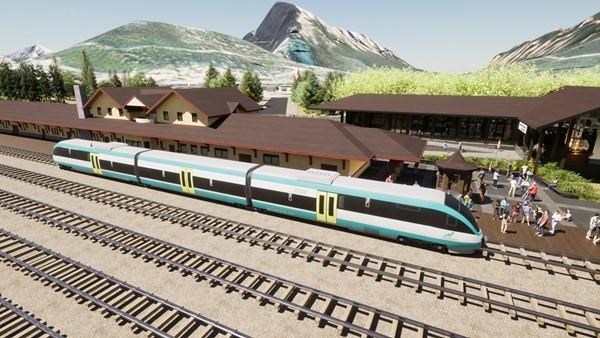CALGARY — Alberta Premier Jason Kenney said Wednesday his government sees potential merit in a proposed $1.5-billion passenger rail link that would connect Banff, to the Calgary International Airport, but added he's not ready to commit to a request for provincial funding for the project.
"We are not at any point ready to commit money to this," Kenney told reporters, the same day the company behind the project announced it has submitted an updated proposal to the province as well as to the Canada Infrastructure Bank.
We have to give this very close rigour and that's the stage that we're at right now."
The proposal from Liricon Capital Ltd. and its newly named investment partner Plenary Americas, a portfolio company of Caisse de dépôt et placement du Québec (CDPQ), would see the rail line constructed as a public-private partnership.
Liricon, which owns the Mount Norquay ski resort in Banff, also holds a long-term lease for the Banff train station. The company has been working for years to develop a multi-modal tourism and transportation hub.
According to Liricon, building a passenger rail line between the popular tourist town and Alberta's largest city would dramatically reduce traffic congestion and greenhouse gas emissions in Banff National Park. It would also help to diversify the province's economy by boosting tourism spending, and improve labour mobility in the area, Kenney told reporters.
The proposed project would operate on a new, dedicated passenger line built within the existing Canadian Pacific Railway Ltd. freight corridor. The proposal envisions service through seven communities, as well as a stop in downtown Calgary, with net ticket costs for Albertans priced at about $20.
Jan Waterous, managing partner with Liricon Capital, said her company's proposal is to have half of the $1.5-billion capital cost provided by the Canada Infrastructure Bank, which has already signed a memorandum of understanding to complete studies and due diligence for the project.
The remaining portion would be covered by Liricon, Plenary and debt financing, Waterous said. While project partners aren't asking the province to commit any upfront capital funding, they are asking it to commit $30 million annually to the project. The province would not start payments until the rail line is complete, which could be as early as 2025.
"It's essentially a mortgage payment on half the capital. And the reason it's only on half the capital is because the other half we can cover from ticket prices," Waterous said in an interview. "So this is actually very good value for the province."
Liricon hopes to get a yes or no from the province by early February, Waterous said, so that it can move on to the advanced design phase of the project.
The project will require twinning a heavily travelled portion of CP Rail's track. In an email, CP spokeswoman Salem Woodrow said the company is co-operating with all involved parties to fully understand and assess the magnitude of the project.
"Any proposal to co-locate a passenger rail service on CP property must preserve our capacity to move freight, both at current levels and those required to support future growth," Woodrow said. "Alberta’s economy depends on a freight rail transportation system that can safely and efficiently move goods and commodities, especially through this critical trade corridor."
Municipal leaders in the area, including the mayors of both Calgary and Banff, praised the passenger rail proposal Wednesday for its potential to improve connectivity in the region while also reducing greenhouse gas emissions.
Liricon says its own conservative estimates suggest a passenger rail line could capture 25 per cent of daily visitors to Banff, reducing the impact of personal vehicles on the national park.
But environmentalists have previously raised questions about the impact increased rail travel could have on wildlife in the area, as well as the potential environmental harm that could come if the rail line proves popular and increases overall visitation to the park.
— With files from Alanna Smith
This report by The Canadian Press was first published Dec. 8, 2021.
Amanda Stephenson, The Canadian Press




